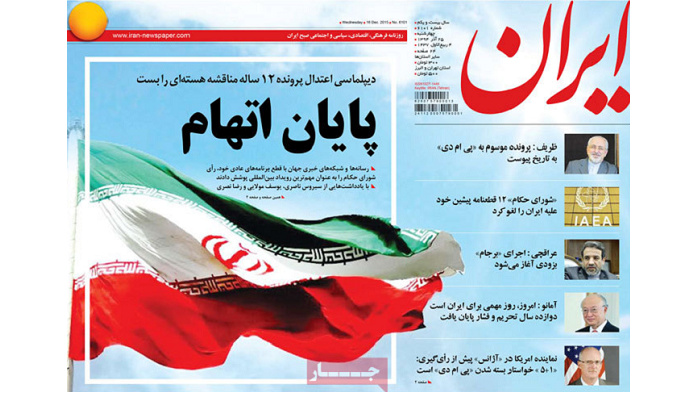Iranian Press and the PMD

(Front page of government mouthpiece Iran Daily on the day after IAEA Board of Governors announced closure of the PMD file/Jaaar.com)
“The Agency has found no credible indications of the diversion of nuclear material in connection with the possible military dimensions to Iran’s nuclear programme,” read the conclusion section of IAEA Director Yukia Amano’s report on the Possible Military Dimensions (PMD) of Iran’s nuclear program. On December 15, 2015, the UN nuclear watchdog’s Board of Governors adopted a resolution considering Amano’s report, and closed Iran’s file in the Agency.
Though a Reuters’ report called the resolution a “symbolic victory for Iran”, not all the Iranian press were of the same idea. The hardliner Kayhan, whose editor-in-chief Hossein Shariatmadari had assured his readership, based on “reliable information”, less than two weeks ago that the PMD file will not be closed, pushed the news to the right side of the front page, assigning its top headline to the news of Nigerian army's raid on the Shia community in northern part of the country.
Responses to PMD closure were predictable, and distributed over partisan fault lines. Reformist media and the pro-government, 'moderate', newspapers hailed the achievement, while Principlist media were largely lukewarm, if not critical.
inspired by Foreign Javad Zarif's remarks after the resolution was officially passed by the IAEA Board of Governors, Arman, Ebtekar, Aftab-e Yazd, Hambastegi, and Mardomsalari, second-tier Reformist newspapers, all chose the same headline: PMD Is History.
E'temad, one of the two leading Reformist newspapers, came with a detailed report of Board of Governors' meeting in Vienna, and the headline "Concluded by the Governors' Decree". "Iran Without Resolutions", read the top headline of Shargh, the other popular Reformist newspaper. "This is a historical day for Iran: no threatening resolution is fettering the country," the newspaper wrote.
Predictably, the most enthusiastic front page belonged to Iran, the government's mouthpiece: the national flag hoisted against a backdrop of the blue sky. The front page was exclusively designated to the PMD closure story, with the top headline read "End of Accusation[s]". "Diplomacy of Moderation Ended the 12-Year Nuclear Dispute" read another title, next to promising quotes by Zarif, Amano and Araghchi.
Principlist newspaper, however, were far from enthusiastic. Jam-e Jam, official mouthpiece of the state-run TV with a thinly-veiled Principlist bent carried the headline: "PMD Closed, Citizens' Demands Persist", quoting hardliner Principlist MP Hossein Naghavi Hosseini: "Why hasn't the economy improved despite JCPOA approval?" Javan, affiliated with the Revolutionary Guards, viewed the PMD closure as just another phase of West's schemes against Iran: "West Closes the 12-Year False PMD File to Take Advantage of JCPOA," read the front page; probably a reference to West's enthusiasm to resume economic relations with Iran after removal of the nuclear sanctions.
The hardliner Vatan-e Emrooz, known for its biting headlines, cast doubt over the termination of the nuclear saga in IAEA, carrying the top headline "The Open Closed File" (lost in translation: the headline is a wordplay with the Persian translation of the title of Stanley Kubrick's "Eye's Wide Shut"). Quoting unknown experts, the newspaper argued that "the case is actually not closed since Amano's report supports US' allegations that Iran has tested nuclear explosive devices. Experts believe that lending credit to United States' accusations in Amano's report will justify the West's pressures against Iran on the one hand, and will provide them leeway to bring up the issue again whenever needed."

